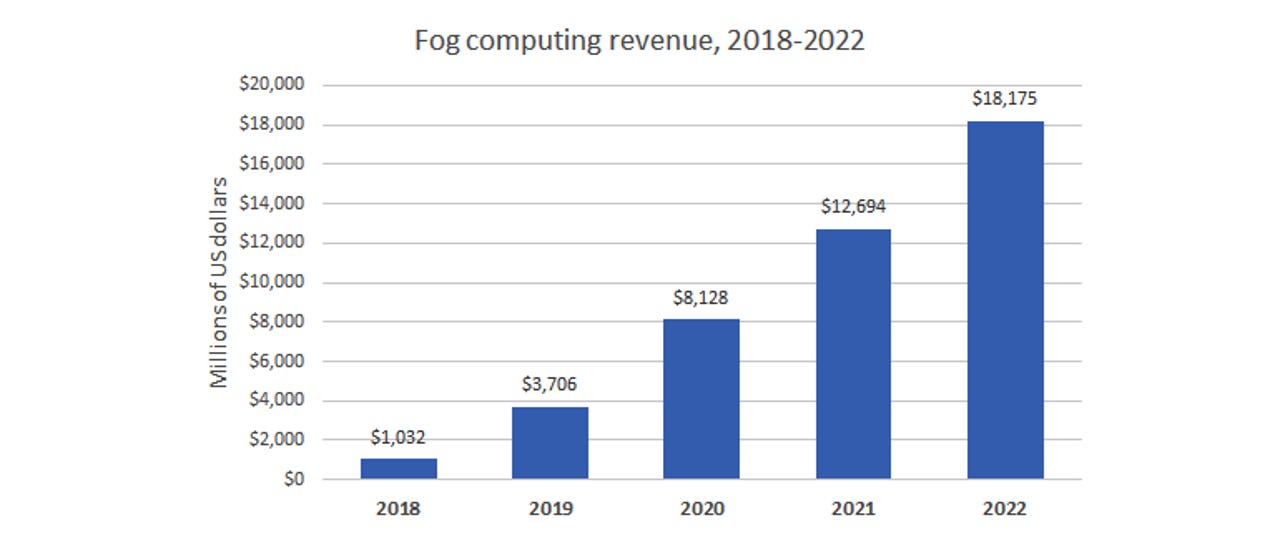Fog computing, artificial intelligence, mobility and cloud computing: Research round-up


Edge computing: The state of the next IT transformation
Let's start with our Special Report, From Cloud to Edge: The Next IT Transformation, where we analyse how the combination of billions of IoT devices and 5G networks is set to drive profound change. One area we investigate is fog computing, which focuses on processing and analysis at the network node level. Wide-ranging analysis from 451 Research puts the market opportunity for fog computing at $18.2 billion by 2022, up from $1.03bn in 2018 and $3.7bn in 2019.
For more see: Edge computing: The state of the next IT transformation
Fog computing spending growth by vertical market
According to 451 Research, the leading verticals for fog computing in 2022, in terms of market share, will be utilities, transportation, healthcare, industrial and agriculture.
For more see: Edge computing: The state of the next IT transformation
AI delivering returns for enterprise early adopters, but not industries created equal
Artificial intelligence spending is ramping as 82 percent of early adopters say they have seen positive returns on investment. According to Deloitte's State of AI in the Enterprise report, the median ROI on an AI project is 17 percent. Deloitte surveyed 1,100 U.S. executives with early AI projects under way. Enterprise software with AI baked in is one big avenue to get started, followed by co-development with partners and cloud services.
For more see: AI delivering returns for enterprise early adopters, but not industries created equal
AI delivering returns for enterprise early adopters, but skills an issue
More than two-thirds (69 percent) of respondents say they are facing a moderate, major or extreme skills gap in AI. Researchers to invent new algorithms and systems, as well as software developers and data scientists, are the skills most in demand.
For more see: AI delivering returns for enterprise early adopters, but not industries created equal
Tech unicorns roam Britain's cities
According to the research by venture capital analytics company Dealroom.co for the UK government's Digital Economy Council, the UK is currently home to 15 unicorn companies -- that is, firms that have reached a $1 billion valuation but haven't yet been acquired or gone on to IPO. In total, 60 unicorns have now been created in the UK since 2008, according to the research, which says the pace has been accelerating in the last three years.
For more see: Tech unicorns roam Britain's cities, but will Brexit scare them away?
Climate change is transforming business
It may not seem like it yet, but climate change is altering the world so drastically that all enterprises will need to undergo a transformation to avoid going extinct. To win in the age of the customer, researcher Forrester says firms must assess and act on risks and opportunities that will arise as a result of climate change.
For more see: Climate change is transforming business
Mobile in Sub-Saharan Africa
Sub-Saharan Africa is a large, diverse region, encompassing 37 countries ranging from South Africa and Nigeria, to Angola, Cameroon, and Mali. It's a region where mobile technology is going through a major period of change, according to trade body the GSMA. By 2025, it's anticipated that 634 million people in the region will be mobile subscribers, up from 44 percent and 444 million people in 2017.
For more see: Mobile in Sub-Saharan Africa: Can world's fastest-growing mobile region keep it up?
Can world's fastest-growing mobile region keep it up?
Although the picture painted by the GSMA is predominantly a positive one, the Sub-Saharan region will continue to lag behind others on key indices such as smartphone penetration and mobile subscriptions. Nonetheless, the report highlights how MNO capex, mobile operator and start-up initiatives, as well as the rise of tech hubs in the region, are all playing a role in turning this potential into a reality.
For more see: Mobile in Sub-Saharan Africa: Can world's fastest-growing mobile region keep it up?
Cloud, enterprise software to drive 2019 IT spending, says Gartner
Global IT spending is expected to grow 3.2 percent in 2019 to $3.8 trillion as enterprise software, cloud and digital transformation projects boost growth, according to Gartner. The projection, outlined at Gartner's Symposium/ITXpo in Orlando, accounts for a shift to everything as a service.
For more see: Cloud, enterprise software to drive 2019 IT spending, says Gartner
Microsoft's Q1 strong due to commercial cloud
Microsoft's first quarter was strong across the board as its commercial cloud, which now includes LinkedIn's enterprise sales, continues its momentum and hit a $34 billion annual revenue run rate. Microsoft reported net income of $8.8 billion, or $1.14 a share, on revenue of $29.1 billion, up 19 percent from a year ago.
For more see: Microsoft's Q1 strong as commercial cloud hits $34 billion annual revenue run rate
Lenovo claims PC pole position
Lenovo has once again claimed the number one spot in PCs shipped globally, with both IDC and Gartner listing the Chinese multinational as shipping around 16,000 desktops, notebooks, and workstations in the third quarter of 2018. In IDC's third-quarter PC rankings, Lenovo was reported as being accountable for 16,152 (24%) of the total devices shipped in the three-month period, while Gartner reported Lenovo as shipping 15,889 units during the same period.
For more see: Lenovo claims pole position in IDC and Gartner PC market share reports
Nokia sets out major job cuts, but steps up 5G push
Finnish telecoms giant Nokia says a big cost-cutting programme will save it €700m ($799m) by the end of 2020 and result in substantial job cuts. Alongside the cost reductions, Nokia is stepping up efforts in 5G mobile radio products and creating a new Enterprise business unit to bring together fast-growing activities under current chief strategy officer Kathrin Buvac.
For more see: Nokia sets out major job cuts but steps up 5G push